EDU30011: Discovering Science - Children's Science Essay
VerifiedAdded on 2022/08/29
|6
|1419
|8
Essay
AI Summary
This essay explores the critical role of children's interests, thinking abilities, and curiosity in science education, arguing for the importance of making science compulsory in school curricula. It emphasizes the development of life skills, analytical abilities, and logical thinking through science education, referencing studies by Hodson (2014), Fleer (2014), Bathgate, Schunn & Correnti (2014), and others. The essay highlights how science fosters curiosity and helps children understand their surroundings, ultimately shaping their ability to ask scientific questions and develop critical thinking skills. It also touches upon the Australian curriculum's objectives and the importance of scientific inquiry. The conclusion reinforces the need to acknowledge and nurture children's interest and curiosity in science, thus promoting a deeper understanding of the world around them and providing a foundation for future career choices.
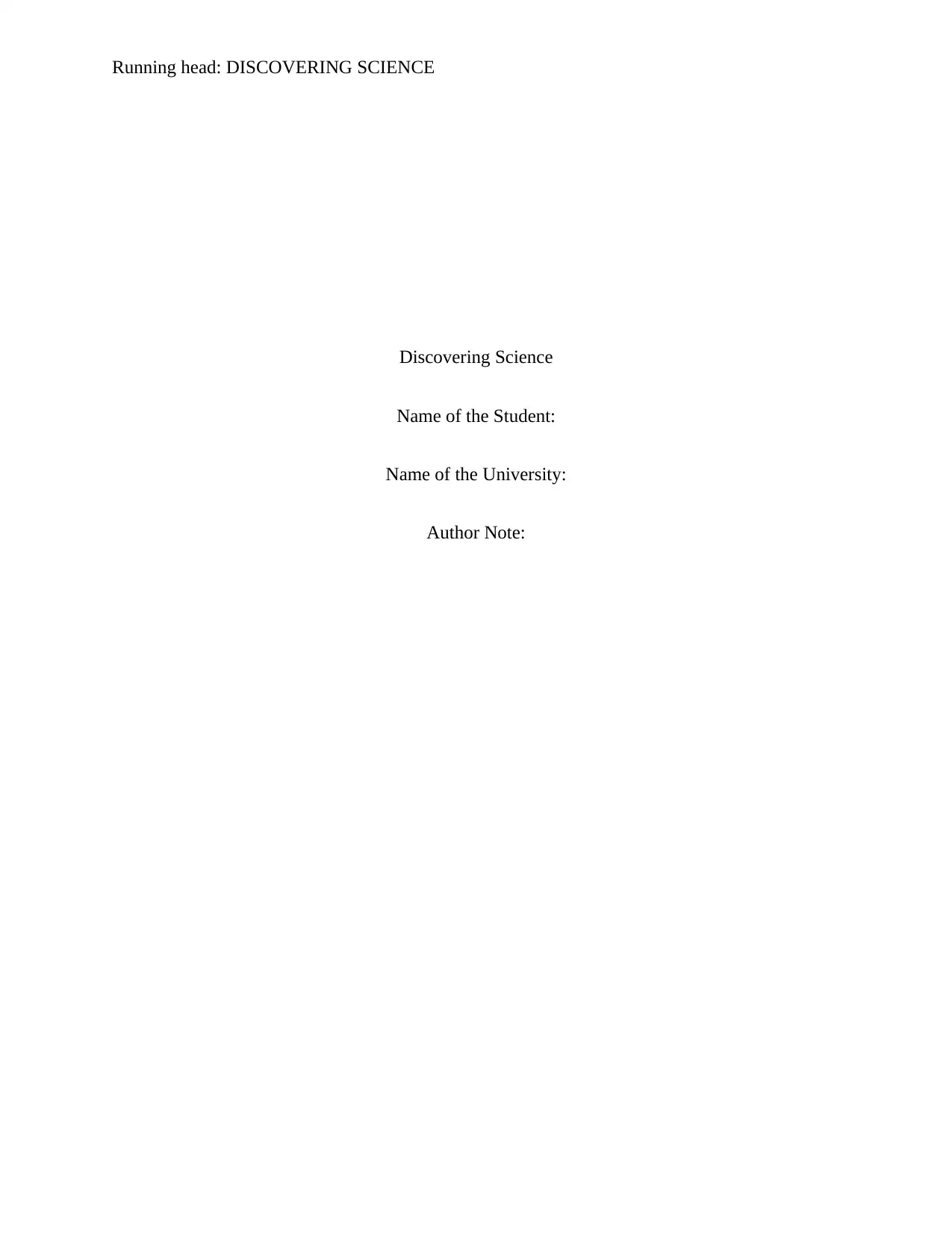
Running head: DISCOVERING SCIENCE
Discovering Science
Name of the Student:
Name of the University:
Author Note:
Discovering Science
Name of the Student:
Name of the University:
Author Note:
Paraphrase This Document
Need a fresh take? Get an instant paraphrase of this document with our AI Paraphraser
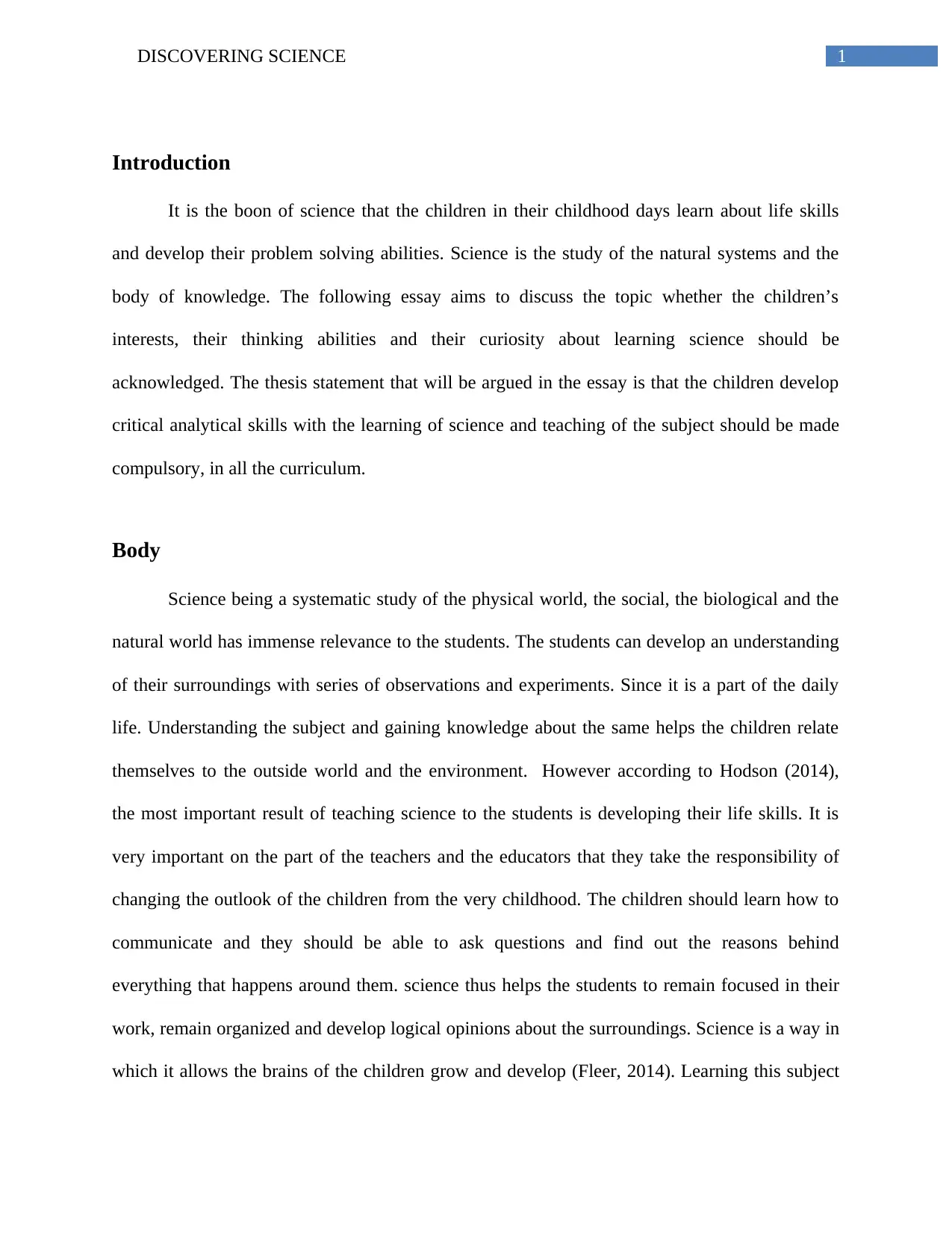
1DISCOVERING SCIENCE
Introduction
It is the boon of science that the children in their childhood days learn about life skills
and develop their problem solving abilities. Science is the study of the natural systems and the
body of knowledge. The following essay aims to discuss the topic whether the children’s
interests, their thinking abilities and their curiosity about learning science should be
acknowledged. The thesis statement that will be argued in the essay is that the children develop
critical analytical skills with the learning of science and teaching of the subject should be made
compulsory, in all the curriculum.
Body
Science being a systematic study of the physical world, the social, the biological and the
natural world has immense relevance to the students. The students can develop an understanding
of their surroundings with series of observations and experiments. Since it is a part of the daily
life. Understanding the subject and gaining knowledge about the same helps the children relate
themselves to the outside world and the environment. However according to Hodson (2014),
the most important result of teaching science to the students is developing their life skills. It is
very important on the part of the teachers and the educators that they take the responsibility of
changing the outlook of the children from the very childhood. The children should learn how to
communicate and they should be able to ask questions and find out the reasons behind
everything that happens around them. science thus helps the students to remain focused in their
work, remain organized and develop logical opinions about the surroundings. Science is a way in
which it allows the brains of the children grow and develop (Fleer, 2014). Learning this subject
Introduction
It is the boon of science that the children in their childhood days learn about life skills
and develop their problem solving abilities. Science is the study of the natural systems and the
body of knowledge. The following essay aims to discuss the topic whether the children’s
interests, their thinking abilities and their curiosity about learning science should be
acknowledged. The thesis statement that will be argued in the essay is that the children develop
critical analytical skills with the learning of science and teaching of the subject should be made
compulsory, in all the curriculum.
Body
Science being a systematic study of the physical world, the social, the biological and the
natural world has immense relevance to the students. The students can develop an understanding
of their surroundings with series of observations and experiments. Since it is a part of the daily
life. Understanding the subject and gaining knowledge about the same helps the children relate
themselves to the outside world and the environment. However according to Hodson (2014),
the most important result of teaching science to the students is developing their life skills. It is
very important on the part of the teachers and the educators that they take the responsibility of
changing the outlook of the children from the very childhood. The children should learn how to
communicate and they should be able to ask questions and find out the reasons behind
everything that happens around them. science thus helps the students to remain focused in their
work, remain organized and develop logical opinions about the surroundings. Science is a way in
which it allows the brains of the children grow and develop (Fleer, 2014). Learning this subject
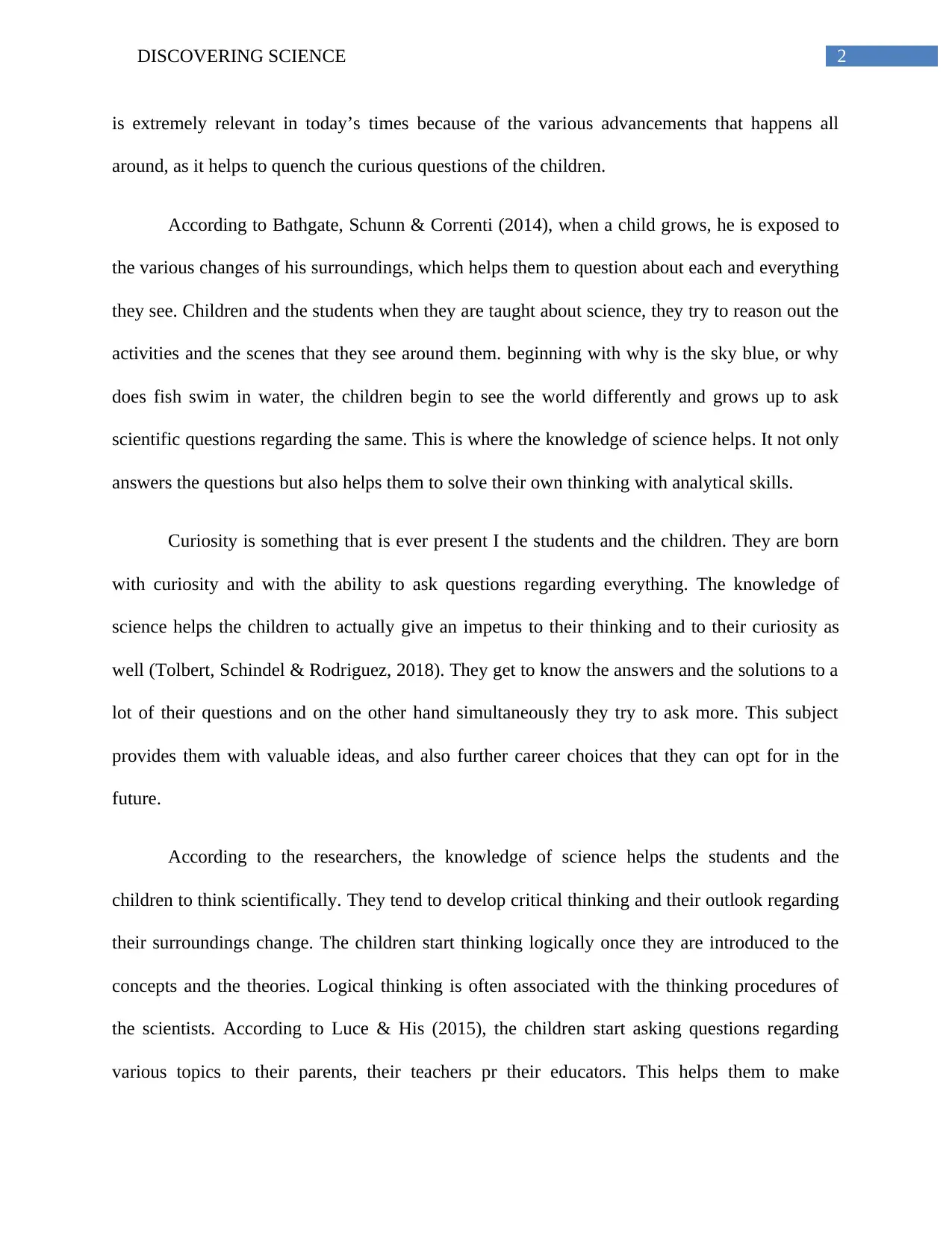
2DISCOVERING SCIENCE
is extremely relevant in today’s times because of the various advancements that happens all
around, as it helps to quench the curious questions of the children.
According to Bathgate, Schunn & Correnti (2014), when a child grows, he is exposed to
the various changes of his surroundings, which helps them to question about each and everything
they see. Children and the students when they are taught about science, they try to reason out the
activities and the scenes that they see around them. beginning with why is the sky blue, or why
does fish swim in water, the children begin to see the world differently and grows up to ask
scientific questions regarding the same. This is where the knowledge of science helps. It not only
answers the questions but also helps them to solve their own thinking with analytical skills.
Curiosity is something that is ever present I the students and the children. They are born
with curiosity and with the ability to ask questions regarding everything. The knowledge of
science helps the children to actually give an impetus to their thinking and to their curiosity as
well (Tolbert, Schindel & Rodriguez, 2018). They get to know the answers and the solutions to a
lot of their questions and on the other hand simultaneously they try to ask more. This subject
provides them with valuable ideas, and also further career choices that they can opt for in the
future.
According to the researchers, the knowledge of science helps the students and the
children to think scientifically. They tend to develop critical thinking and their outlook regarding
their surroundings change. The children start thinking logically once they are introduced to the
concepts and the theories. Logical thinking is often associated with the thinking procedures of
the scientists. According to Luce & His (2015), the children start asking questions regarding
various topics to their parents, their teachers pr their educators. This helps them to make
is extremely relevant in today’s times because of the various advancements that happens all
around, as it helps to quench the curious questions of the children.
According to Bathgate, Schunn & Correnti (2014), when a child grows, he is exposed to
the various changes of his surroundings, which helps them to question about each and everything
they see. Children and the students when they are taught about science, they try to reason out the
activities and the scenes that they see around them. beginning with why is the sky blue, or why
does fish swim in water, the children begin to see the world differently and grows up to ask
scientific questions regarding the same. This is where the knowledge of science helps. It not only
answers the questions but also helps them to solve their own thinking with analytical skills.
Curiosity is something that is ever present I the students and the children. They are born
with curiosity and with the ability to ask questions regarding everything. The knowledge of
science helps the children to actually give an impetus to their thinking and to their curiosity as
well (Tolbert, Schindel & Rodriguez, 2018). They get to know the answers and the solutions to a
lot of their questions and on the other hand simultaneously they try to ask more. This subject
provides them with valuable ideas, and also further career choices that they can opt for in the
future.
According to the researchers, the knowledge of science helps the students and the
children to think scientifically. They tend to develop critical thinking and their outlook regarding
their surroundings change. The children start thinking logically once they are introduced to the
concepts and the theories. Logical thinking is often associated with the thinking procedures of
the scientists. According to Luce & His (2015), the children start asking questions regarding
various topics to their parents, their teachers pr their educators. This helps them to make
⊘ This is a preview!⊘
Do you want full access?
Subscribe today to unlock all pages.

Trusted by 1+ million students worldwide
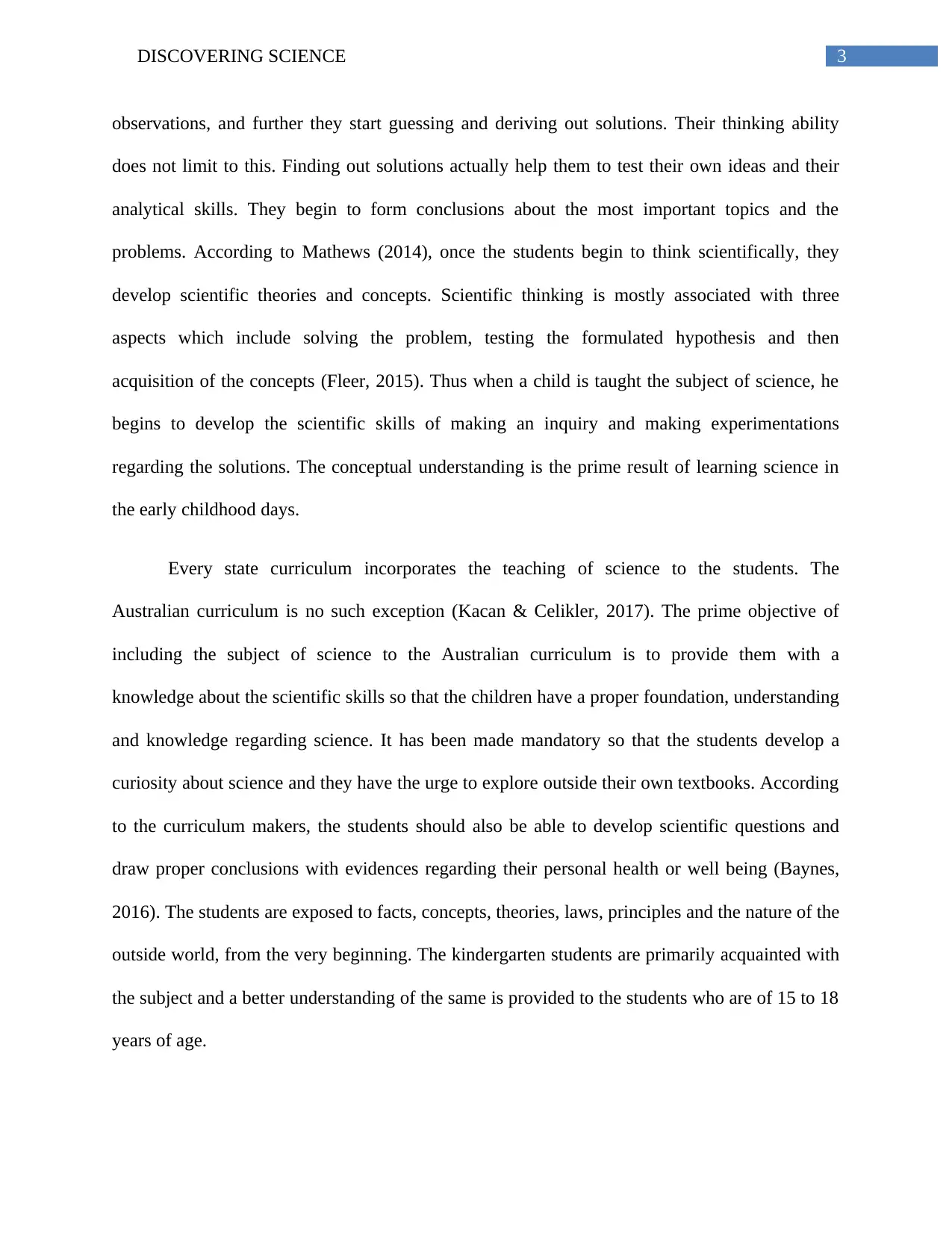
3DISCOVERING SCIENCE
observations, and further they start guessing and deriving out solutions. Their thinking ability
does not limit to this. Finding out solutions actually help them to test their own ideas and their
analytical skills. They begin to form conclusions about the most important topics and the
problems. According to Mathews (2014), once the students begin to think scientifically, they
develop scientific theories and concepts. Scientific thinking is mostly associated with three
aspects which include solving the problem, testing the formulated hypothesis and then
acquisition of the concepts (Fleer, 2015). Thus when a child is taught the subject of science, he
begins to develop the scientific skills of making an inquiry and making experimentations
regarding the solutions. The conceptual understanding is the prime result of learning science in
the early childhood days.
Every state curriculum incorporates the teaching of science to the students. The
Australian curriculum is no such exception (Kacan & Celikler, 2017). The prime objective of
including the subject of science to the Australian curriculum is to provide them with a
knowledge about the scientific skills so that the children have a proper foundation, understanding
and knowledge regarding science. It has been made mandatory so that the students develop a
curiosity about science and they have the urge to explore outside their own textbooks. According
to the curriculum makers, the students should also be able to develop scientific questions and
draw proper conclusions with evidences regarding their personal health or well being (Baynes,
2016). The students are exposed to facts, concepts, theories, laws, principles and the nature of the
outside world, from the very beginning. The kindergarten students are primarily acquainted with
the subject and a better understanding of the same is provided to the students who are of 15 to 18
years of age.
observations, and further they start guessing and deriving out solutions. Their thinking ability
does not limit to this. Finding out solutions actually help them to test their own ideas and their
analytical skills. They begin to form conclusions about the most important topics and the
problems. According to Mathews (2014), once the students begin to think scientifically, they
develop scientific theories and concepts. Scientific thinking is mostly associated with three
aspects which include solving the problem, testing the formulated hypothesis and then
acquisition of the concepts (Fleer, 2015). Thus when a child is taught the subject of science, he
begins to develop the scientific skills of making an inquiry and making experimentations
regarding the solutions. The conceptual understanding is the prime result of learning science in
the early childhood days.
Every state curriculum incorporates the teaching of science to the students. The
Australian curriculum is no such exception (Kacan & Celikler, 2017). The prime objective of
including the subject of science to the Australian curriculum is to provide them with a
knowledge about the scientific skills so that the children have a proper foundation, understanding
and knowledge regarding science. It has been made mandatory so that the students develop a
curiosity about science and they have the urge to explore outside their own textbooks. According
to the curriculum makers, the students should also be able to develop scientific questions and
draw proper conclusions with evidences regarding their personal health or well being (Baynes,
2016). The students are exposed to facts, concepts, theories, laws, principles and the nature of the
outside world, from the very beginning. The kindergarten students are primarily acquainted with
the subject and a better understanding of the same is provided to the students who are of 15 to 18
years of age.
Paraphrase This Document
Need a fresh take? Get an instant paraphrase of this document with our AI Paraphraser
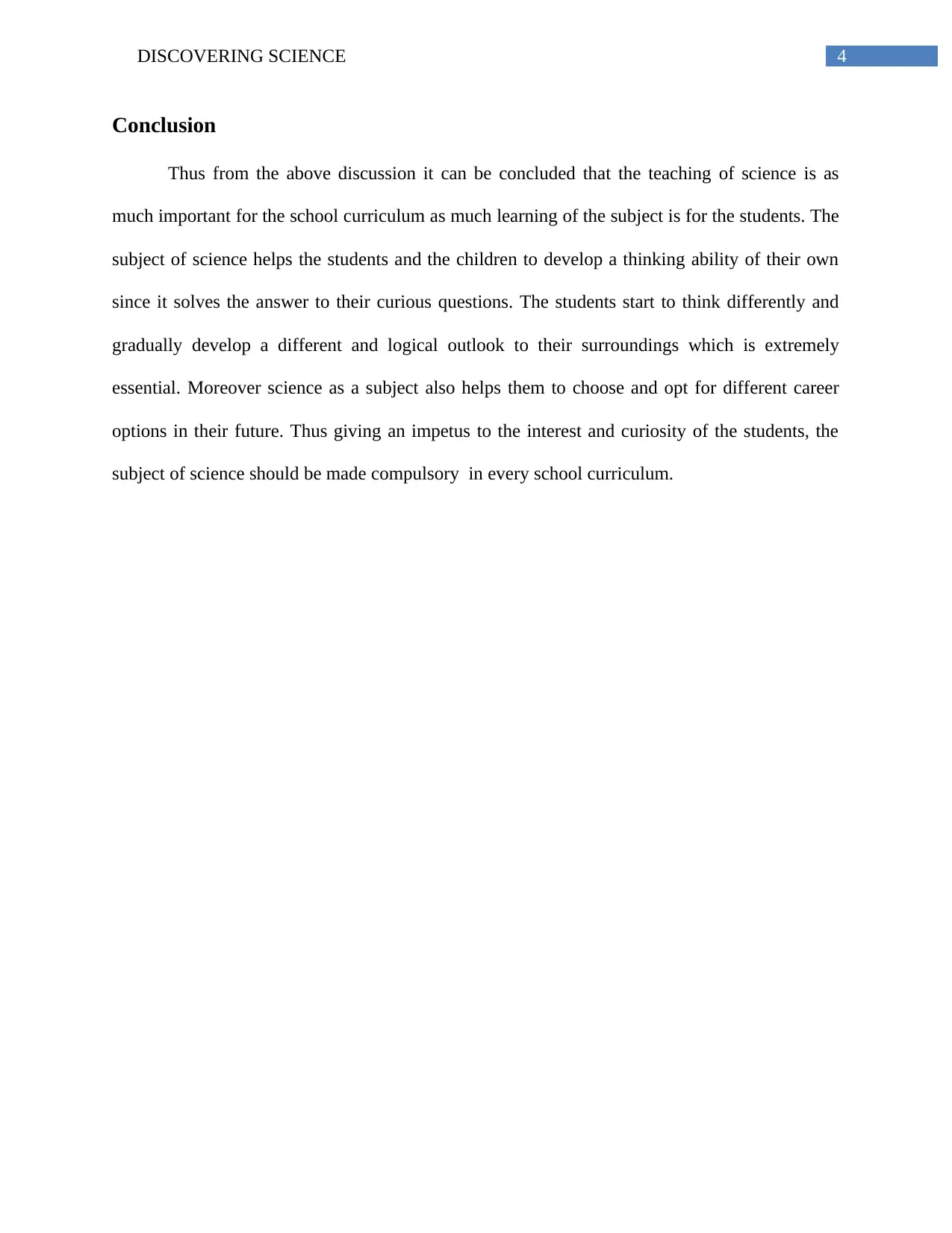
4DISCOVERING SCIENCE
Conclusion
Thus from the above discussion it can be concluded that the teaching of science is as
much important for the school curriculum as much learning of the subject is for the students. The
subject of science helps the students and the children to develop a thinking ability of their own
since it solves the answer to their curious questions. The students start to think differently and
gradually develop a different and logical outlook to their surroundings which is extremely
essential. Moreover science as a subject also helps them to choose and opt for different career
options in their future. Thus giving an impetus to the interest and curiosity of the students, the
subject of science should be made compulsory in every school curriculum.
Conclusion
Thus from the above discussion it can be concluded that the teaching of science is as
much important for the school curriculum as much learning of the subject is for the students. The
subject of science helps the students and the children to develop a thinking ability of their own
since it solves the answer to their curious questions. The students start to think differently and
gradually develop a different and logical outlook to their surroundings which is extremely
essential. Moreover science as a subject also helps them to choose and opt for different career
options in their future. Thus giving an impetus to the interest and curiosity of the students, the
subject of science should be made compulsory in every school curriculum.
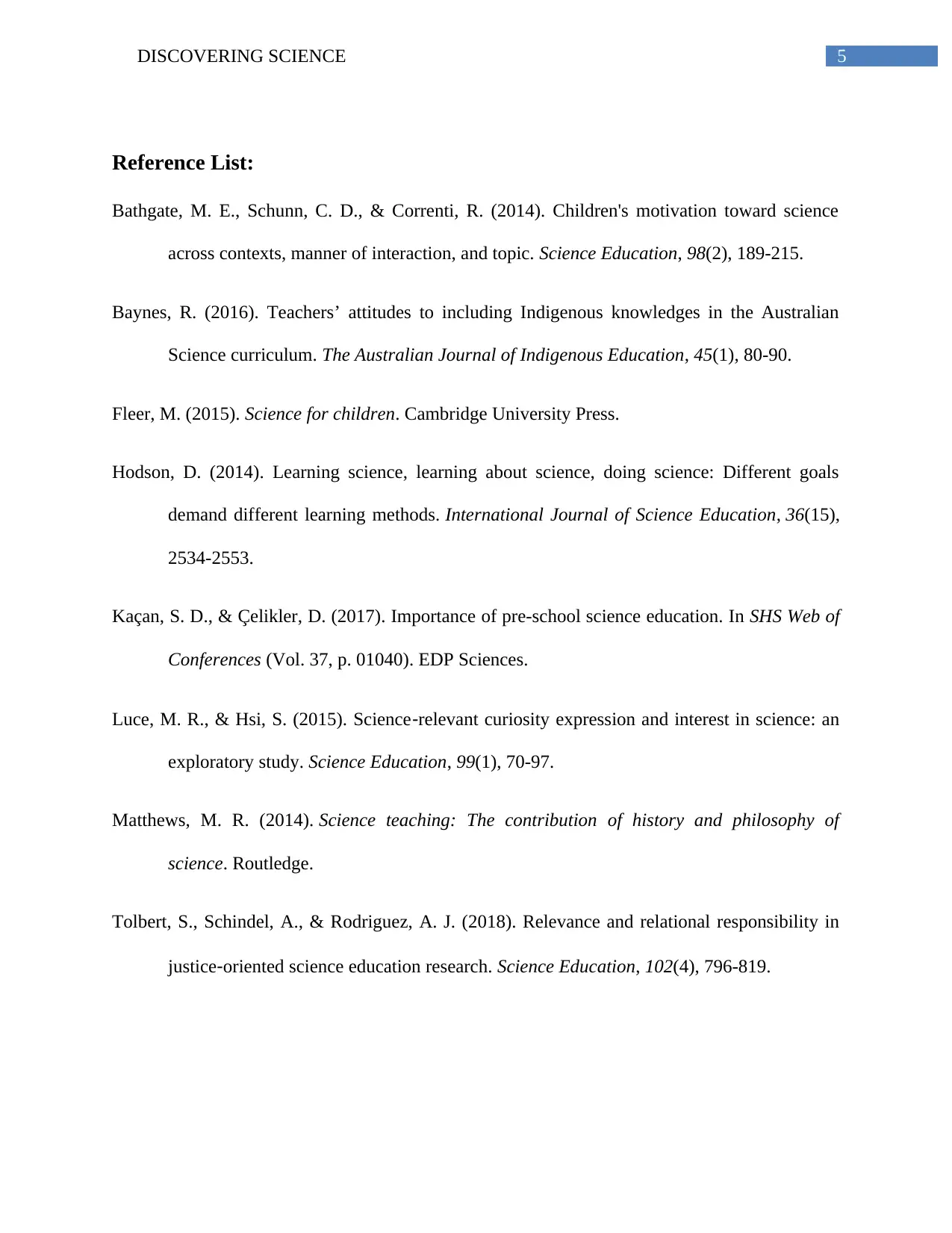
5DISCOVERING SCIENCE
Reference List:
Bathgate, M. E., Schunn, C. D., & Correnti, R. (2014). Children's motivation toward science
across contexts, manner of interaction, and topic. Science Education, 98(2), 189-215.
Baynes, R. (2016). Teachers’ attitudes to including Indigenous knowledges in the Australian
Science curriculum. The Australian Journal of Indigenous Education, 45(1), 80-90.
Fleer, M. (2015). Science for children. Cambridge University Press.
Hodson, D. (2014). Learning science, learning about science, doing science: Different goals
demand different learning methods. International Journal of Science Education, 36(15),
2534-2553.
Kaçan, S. D., & Çelikler, D. (2017). Importance of pre-school science education. In SHS Web of
Conferences (Vol. 37, p. 01040). EDP Sciences.
Luce, M. R., & Hsi, S. (2015). Science‐relevant curiosity expression and interest in science: an
exploratory study. Science Education, 99(1), 70-97.
Matthews, M. R. (2014). Science teaching: The contribution of history and philosophy of
science. Routledge.
Tolbert, S., Schindel, A., & Rodriguez, A. J. (2018). Relevance and relational responsibility in
justice‐oriented science education research. Science Education, 102(4), 796-819.
Reference List:
Bathgate, M. E., Schunn, C. D., & Correnti, R. (2014). Children's motivation toward science
across contexts, manner of interaction, and topic. Science Education, 98(2), 189-215.
Baynes, R. (2016). Teachers’ attitudes to including Indigenous knowledges in the Australian
Science curriculum. The Australian Journal of Indigenous Education, 45(1), 80-90.
Fleer, M. (2015). Science for children. Cambridge University Press.
Hodson, D. (2014). Learning science, learning about science, doing science: Different goals
demand different learning methods. International Journal of Science Education, 36(15),
2534-2553.
Kaçan, S. D., & Çelikler, D. (2017). Importance of pre-school science education. In SHS Web of
Conferences (Vol. 37, p. 01040). EDP Sciences.
Luce, M. R., & Hsi, S. (2015). Science‐relevant curiosity expression and interest in science: an
exploratory study. Science Education, 99(1), 70-97.
Matthews, M. R. (2014). Science teaching: The contribution of history and philosophy of
science. Routledge.
Tolbert, S., Schindel, A., & Rodriguez, A. J. (2018). Relevance and relational responsibility in
justice‐oriented science education research. Science Education, 102(4), 796-819.
⊘ This is a preview!⊘
Do you want full access?
Subscribe today to unlock all pages.

Trusted by 1+ million students worldwide
1 out of 6
Related Documents
Your All-in-One AI-Powered Toolkit for Academic Success.
+13062052269
info@desklib.com
Available 24*7 on WhatsApp / Email
![[object Object]](/_next/static/media/star-bottom.7253800d.svg)
Unlock your academic potential
Copyright © 2020–2026 A2Z Services. All Rights Reserved. Developed and managed by ZUCOL.





